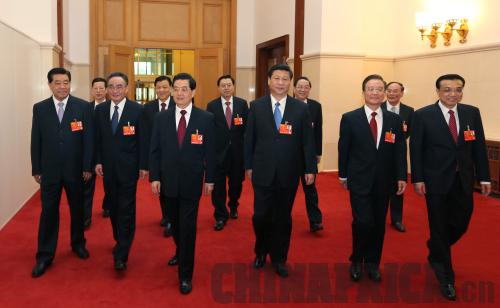|
 |
|
China's former and current leaders marching confidently into the future (LAN HONGGUANG) |
Corruption busters
Experts observe that fighting corruption will be an important task for the new leadership, which began to address corruption issues immediately after the 18th CPC National Congress held in November of last year.
In his election speech after becoming the Party general secretary, Xi used a Chinese proverb, "To forge iron, you need a strong hammer," to warn government officials to steer clear of corruption.
Xi also stressed that the Party should swat both "tigers" (meaning high-ranking corrupt officials) and "flies" (the pawns of these corrupt officials) at the same time.
"Though it is very hard to eradicate corruption in the short term, the new leadership has shown its strong determination to fight corruption in an active and persistent manner," said Huang Weiting, a researcher with Qiushi magazine, a theoretical research publication by the CPC Central Committee. "Anti-corruption campaigns will be enhanced in the future."
In fact, China has made achievements in this regard. In the three months following the 18th National Party Congress, a total of 27 senior officials were investigated on charges of corruption.
Institutional reform deepened
Besides conducting the leadership transition, this year's lianghui made headlines by reforming the State Council, China's cabinet.
This is the seventh reform of the State Council since China's adoption of the reform and opening-up policy in the late 1970s. During this year's reform, the number of departments under the State Council was reduced from 27 to 25.
"The core of the reform plan [this year] is to transform government functions," Li Keqiang told the press on March 17. "It is also about streamlining government and delegating powers to the lower levels. We need to pass on responsibilities that the market and society can manage well."
He noted that when he visited local communities, he often heard people complaining that they would need to get approval from dozens of government departments to get something done or to start a business. People were quite frustrated by this. "Such a state of affairs is not good for government efficiency. It might create opportunities for corruption," Li stressed.
Right now, there are over 1,700 items that still require approval from government departments. Li is determined to cut that figure by at least one third during his term as premier.
"The government has taken on some misplaced roles, and we should restore to the market the responsibilities that have improperly been thrust on the government," he added. "We will keep our promises and match our words with our actions."
Streamlining departments
This year's State Council reforms include dismantling the Ministry of Railways and incorporating its administrative power into the Ministry of Transport and the National Development and Reform Commission; setting up a National Health and Family Planning Commission by merging the existing Ministry of Health with the National Population and Family Planning Commission; elevating the status of the State Administration of Food and Drug to make it a general administration; and merging China's two media regulators, the General Administration of Press and Publication and the State Administration of Radio, Film and Television, into one.
Of these measures, lifting the status of the State Administration of Food and Drug to make it a general administration is a widely-lauded move to improve food and drug safety.
"This is great progress in the work of supervising food and drug safety in China," Chen Xiaohong, Member of the CPPCC National Committee and Vice Minister of Health, told ChinAfrica. According to Chen, this reform caters to people's desire to improve their livelihoods as frequent incidents in food safety are a major source of concern for the public.
Overlapping supervision from different departments and some supervision "blind spots" are weak links in the current food safety supervision system, according to a report delivered by then State Councilor Ma Kai, who is now vice premier, to the NPC's annual session.
Before the reform, different departments supervised different types of food circulation. A tomato sold at a farmers' market was under the purview of the agricultural department; but in a supermarket the same tomato would be supervised by the industry and commerce administration; tomatoes that were made into ketchup were under the authority of administration of quality supervision, inspection and quarantine; when a tomato was prepared for customers at a restaurant, the food and drug administration was responsible for ensuring that it was safe for consumers. "When problems emerge, no one knows which department should be responsible," said Chen.
In recent years, problems in food safety such as melamine-tainted milk and chicken containing excessive amounts of antibiotics have frustrated the Chinese people.
"It is good to integrate the function of supervising food production, circulation and catering sector into one department. No matter what problems may arise [in future], one particular department should be responsible," said Chen.
|